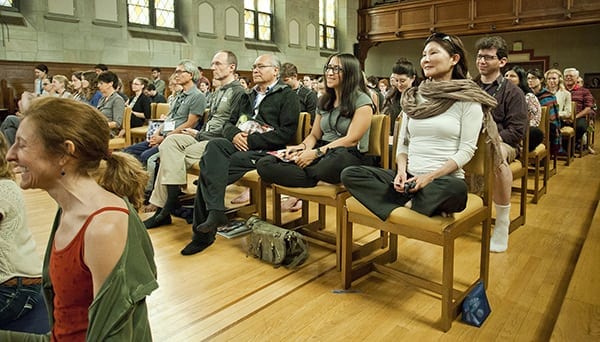The Mind and Life Summer Research Institute
By Mind and Life Summer Research InstituteSince 2004, one of the cornerstones of Mind and Life’s programming has been the Mind and Life Summer Research Institute (MLSRI), which was designed to support the growing field of contemplative studies. This unique event is a week-long conference that incorporates academic presentations, informal breakout groups, poster sessions, and periods of meditation, yoga, and tai chi each day, as well as a one-day silent retreat. The hybrid academic/retreat format offers opportunities for deep dialogue across disciplines, as well as inquiry through meditative practices, underscoring the challenges of honoring and learning from first-person experience. One of the broad goals of contemplative studies is to create an integrated way of knowing by combining standard third-person methodologies from the sciences and humanities with first-person modes of introspection that have been developed by diverse contemplative and philosophical traditions. The MLSRI has been instrumental in supporting this community through shared knowledge, fostering relationships among participants, and also through our Varela Awards program, which funds contemplative research projects that often emerge from collaborations formed at the event.
The 12th annual MLSRI once again took place at the beautiful Garrison Institute in upstate New York, perched on the banks of the Hudson River, which year in and year out has provided a nurturing and generative container for attendees. Themed on Fear and Trust in Self and Society, presentations and discussions drew on research in both the sciences and the humanities, including neuroscience, psychology, philosophy, religion, and contemplative studies. Plenary lectures ranged from an overview of attachment theory and its connection to Buddhist conceptions of “selflessness,” to an exploration of the role that social relationships play in neurophysiological threat processing, to examinations of fear and trust from Buddhist and contemplative Christian perspectives. In addition to these kinds of stimulating presentations, as well as the generative faculty-led breakout sessions that followed, we explored the challenges and rewards of interdisciplinary dialogue through a panel discussion and small group work. Small groups also provided an opportunity to further cultivate the sense of community that naturally forms over the week.
This year, the MLSRI was infused with a new freshness, as the majority of attendees were joining us for the first time. We are heartened to see that word of this interdisciplinary approach is spreading, as students from both established and emerging labs, universities, and research centers across the world brought enthusiasm, new ideas, and an overall eagerness to be part of this work. Additionally, thepresentations and dynamic conversations that ensued seemed to herald a maturation of the discourse at large, as the overarching issue of “context” became an important thread interweaving many of the discussions. Historically, the brain—and by extension, the mind—has been treated as an isolated object of study explored only through third-person scientific and academic means (such as through neuroimaging research, or scholarly textual analysis). Stemming from the vision of Francisco Varela, one of Mind and Life’s founders, it has been a goal of this field to expand the investigation of the mind beyond the brain and into the body and environment by integrating diverse first, second, and third person perspectives. This movement has gained momentum thanks to the ongoing diligent work of our numerous individual and organizational partners, both near and far.
This post was originally published on the Mind & Life Institute blog.
